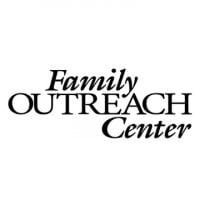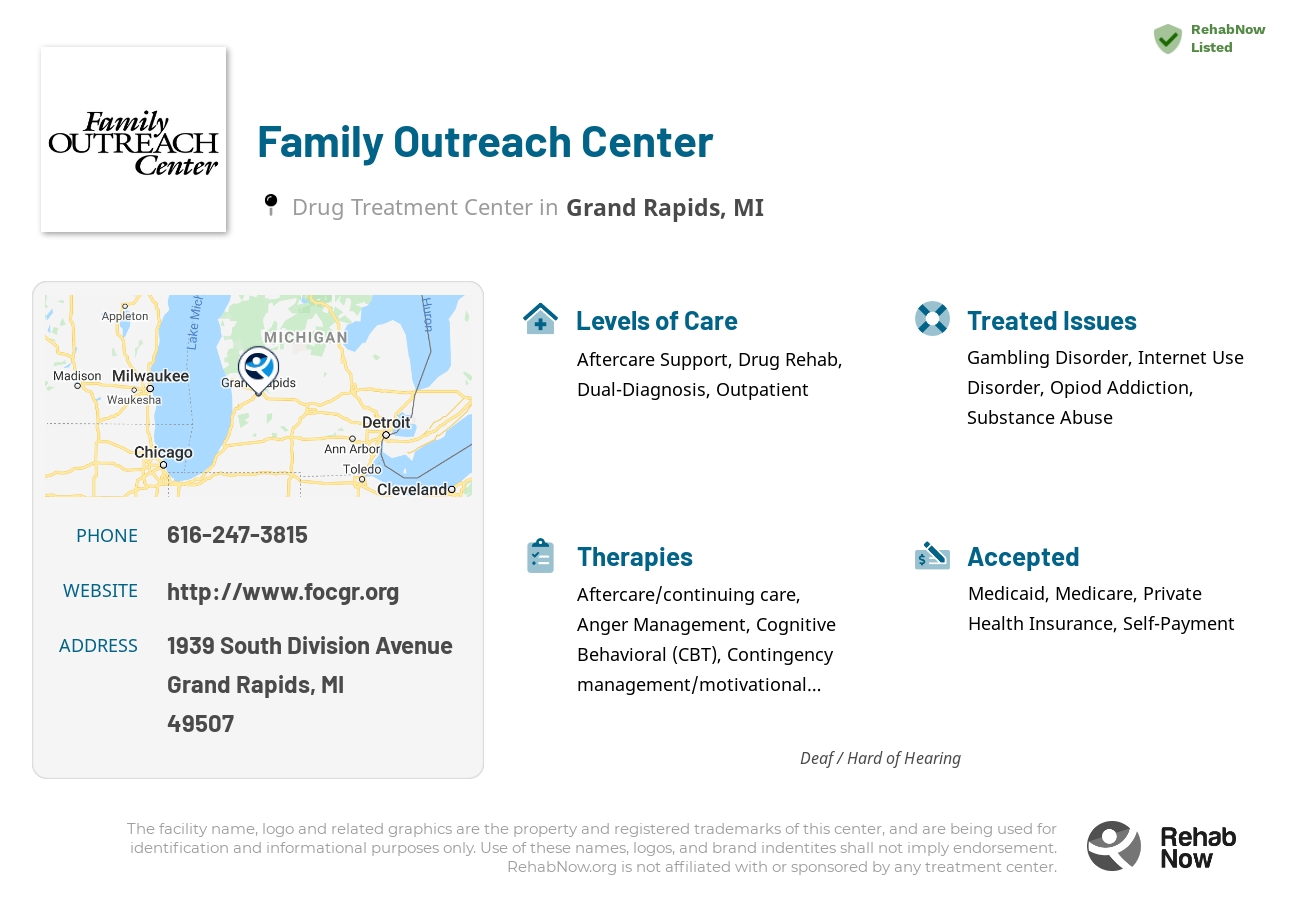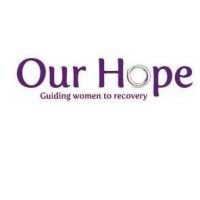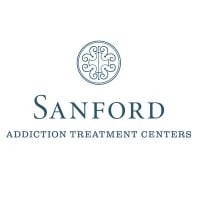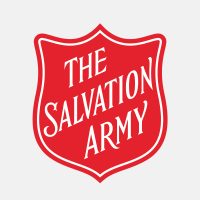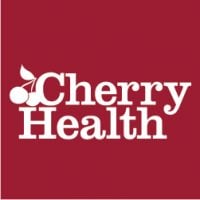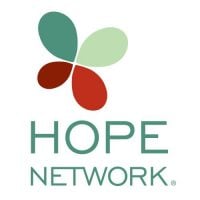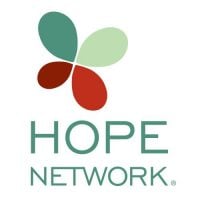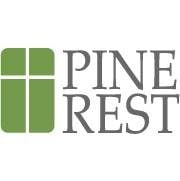Family Outreach Center
Drug Rehab Center in Grand Rapids, Michigan
The Family Outreach Center in Grand Rapids, MI offers comprehensive addiction treatment services and personalized treatment plans with a focus on evidence-based therapies such as cognitive behavioral therapy and dialectical behavior therapy, as well as holistic therapies including yoga, meditation, art therapy and mindfulness to help individuals find peace in their recovery journey.
About This Grand Rapids, MI Facility
Family Outreach Center in Grand Rapids, Michigan is a premier facility offering a wide range of addiction and substance abuse services. Established in 1988, the center provides general outpatient services, as well as Intensive Outpatient Program (IOP) options. They also offer a medication-assisted treatment program for those struggling with opioid addiction. Their experienced staff consists of substance abuse counselors, psychiatrists, and medical doctors who provide therapy and medical support.
Family Outreach Center provides comprehensive services for those dealing with addiction. This includes individual, group, and family counseling, along with educational classes and seminars aimed at promoting sobriety. Those enrolled in their IOP program or medication-assisted treatment will also receive medication management, relapse prevention classes, and access to community resources. The center also offers a variety of holistic services including acupuncture, nutrition planning, music and art therapy, as well as yoga and other wellness services.
Family Outreach Center holds accreditation from the Council on Accreditation and is a licensed mental health provider. They are also privileged to accept most insurance plans, making accessibility to treatment options more manageable. In addition, the center has received recognition from the State of Michigan for their exemplary service to the community. As a unique offering, they are home to the only LGBT-specific addiction treatment program in the area. They provide an inclusive and non-judgmental environment that allows clients to heal and recover in a safe space.
Genders
Ages
Modality
Additional
Conditions and Issues Treated
Rehab centers exist in Grand Rapids, MI to help individuals bounce back from substance abuse, which is an umbrella term for drug and alcohol addiction. Drug addiction refers to the use of illegal drugs and improper use of prescription drugs. Centers like Family Outreach Center provide individuals a chance to access individual and group therapy that can be monumental for recovery.
Substance abuse includes all problems that stem out from using various psychoactive substances. It is also a diagnostic term used by Diagnostic and Statistical Manual of Mental Disorders (DSM-IV) to define the mental and physical impairment or distress caused by misuse and overuse of certain substances in a period of 12 months.
Opioid addiction involves addiction to legal or illegal opioids. It may happen very quickly with any opioid use. Sometimes within a matter of days. Opioid addiction is a known as a high-risk factor for future heroin addiction.
Opioid withdrawal can be extremely uncomfortable and lead the user to continue to use even if they want to quit. Stopping using an opioid requires careful medical observation. Sometimes the withdrawal can persist for many weeks, which can put the user at a high risk for relapse.
It is recommended to receive inpatient treatment and a medically supervised detox like those offered at Family Outreach Center in Grand Rapids, MI, MI, to manage the withdrawal process while learning lasting tools to maintain recovery. In some circumstances medications can be used to manage opioid addiction.
People with dual diagnosis have coexisting addiction and a mental disorder. 9.2 million US adults had a co-occurring disorder in 2018, so not just limited to Michigan residents. Best treatment combines medication, psychotherapy (talk therapy), support group, and inpatient rehabilitation. Sometimes, complementary therapies – yoga, massage, and acupuncture – may also be used.
Levels of Care Offered
This center offers a variety of custom treatment tailored to individual recovery. Currently available are Aftercare Support, Drug Rehab, Dual-Diagnosis, Outpatient, with additional therapies available as listed below.
Outpatient treatment can be considered the lowest intensity level of addiction treatment in Grand Rapids, MI. It is ideal for early phase addiction or lower intensity addictions. Family Outreach Center peer group support, 12-step programs, and individual counseling may still be involved.
After treatment, addiction treatment can be frightening for newly sober people. Aftercare support provided by Family Outreach Center is designed to give resources and help on a continued basis. It can involve finding housing in and around Michigan, setting up 12-step meeting groups, continued medical monitoring, and counseling.
Family Outreach Center‘s Therapies & Programs
Individual therapy aims to identify the core issues that would have led the patient to substance abuse and address the root cause effectively. Patients find the therapist as a person who they can trust. It helps them to open up and discuss personal and sensitive issues, which they may not be comfortable discussing in a group.
Couples therapy is an approach wherein the patients and their partners are engaged together as a part of the treatment process. When a person becomes a victim of substance abuse, it affects the patient and the people around him, particularly his partner. Their relationship can become strained due to lack of communication, financial issues, loss of trust, lack of intimacy, and physical abuse in more severe cases.
Couples therapy addresses these issues and tries to rebuild the trust between the partners. The partner’s involvement in the process will result in greater chances of treatment success and sustained recovery.
Family therapy is a set of therapeutic approaches that assumes that the entire family is a system. It utilizes the strengths and resources of the family to help the patient refrain from resorting to substance abuse. It helps to repair relationships and improve communication between family members.
Group therapy happens at Family Outreach Center in a controlled group environment, as opposed to a one-on-one setting. It supports Grand Rapids, MI patients’ recovery by offering a sense of comfort and letting them know that they are not alone. Through shared conversations, patients also learn to develop faith and understanding and gain insight on their addictions.
Unresolved trauma is often a key reason why many patients resorted to substance abuse. Trauma therapy refers to treatment wherein specialist therapists help the patients to resolve the trauma that led the patients to substance abuse. The trauma could be physical abuse, sexual abuse, war, natural disasters, divorce, accident, loss of a loved one, etc. Thinking of these traumatic events causes emotional disturbances like anxiety, depression and results in addiction. If trauma is the primary cause of substance abuse, then both issues must be addressed. Otherwise, there is a risk of relapse. Trauma therapy also improves the cognitive functions and provides long term benefits.
Dialectical Behavior Therapy (DBT) is an improved version of Cognitive Behavioral Therapy (CBT). DBT is a treatment of choice for people suffering from self-harming behaviors characterized by cutting and suicidal thoughts or inclinations.
This treatment is developed to help individuals recognize their thought patterns, behaviors, and feelings. It has demonstrated its effectiveness for people that are finding it difficult to control their emotions and urges. Conditions such as obsessive-compulsive disorder and borderline personality disorder also benefit from DBT as it imparts individuals stress-management techniques and enhanced self-esteem so they can sustain their sobriety by reducing the impact of triggers and out-of-control emotions.
Cognitive behavioral therapy (CBT) is a way of addressing concerns through talking. It can be used in individual counseling sessions. Talking through issues with professionals at Family Outreach Center can identify sources of discomfort or unhealthy thoughts. It is a way of learning about yourself and your individual perceptions. CBT is a healthy way of addressing some behaviors which may be bringing unintended consequences in your life.
Eye Movement Desensitization and Reprocessing (EMDR) is designed to support patients in treating trauma. Patients follow a bar of light throughout the session or watch their therapist’s finger travel back and forth. All this imitates the eye movements of REM sleep. These are the same movements that enable memories to be reprocessed by the brain. This reduces the impact and reprocesses traumatic memories have individuals, reducing the desire to shelter or escape by abusing substances.
Contingency management is a way to help motivate someone to remain substance free. It is a process of rewarding positive choices and good outcomes. As humans we are wired to recreate experiences that lead to positive feelings. Through this method incentives are used for completing positive steps towards a sober life. This may be a reward for attending meetings, remaining sober or for employment goals.
Payment Options Accepted
For specific insurance or payment methods please contact us.
Is your insurance accepted?
Ask an expert, call (888) 674-0062
Additional Details
Specifics, location, and helpful extra information.
Grand Rapids, Michigan 49507 Phone Number(616) 247-3815 Meta DetailsUpdated November 25, 2023
Staff Verified
What else do people call Family Outreach Center?
People have occasionally also searched for “Family Outreach Center OP MH and Substance Use Disorder Prog in Michigan”
Patient Reviews
There are no reviews yet. Be the first one to write one.
Grand Rapids, Michigan Addiction Information
Michigan has the second-highest rate of drug and alcohol abuse in the nation. Heroin is linked to more than 50% of the state's hepatitis C cases. Marijuana is the drug most often associated with crimes in Michigan, followed by methamphetamines. Opioids alone are responsible for almost 20% of all drug overdose deaths in Michigan.
In 2012, there were 97 drug-related deaths in Grand Rapids, Michigan. There are 9,518 hospitalizations due to drug abuse that same year. The most common drugs of abuse are heroin, marijuana, and prescription drugs. There are many different types of drug addiction, and each one requires a specific approach to treatment. The goal of treatment is to help the individual overcome their addiction and learn how to live a sober life.
Treatment in Nearby Cities
- Owosso, MI (75.5 mi.)
- L'anse, MI (295.9 mi.)
- Tecumseh, MI (110.0 mi.)
- Farmington Hills, MI (121.1 mi.)
- Kincheloe, MI (236.2 mi.)
Centers near Family Outreach Center
The facility name, logo and brand are the property and registered trademarks of Family Outreach Center, and are being used for identification and informational purposes only. Use of these names, logos and brands shall not imply endorsement. RehabNow.org is not affiliated with or sponsored by Family Outreach Center.
